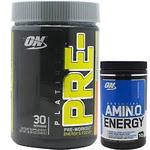|
Essential Amino Acids: Essential amino acids are not only building blocks for protein synthesis they are also signalling molecules which set off and regulate muscle protein synthesis. 7-9grams of essential amino acids maximally stimulates muscle protein synthesis, increases amino acid oxidation and allows for muscle tissue increase. The consumption of amino acids pre- and during exercise shows positive results in enhancing adaption’s to resistance exercise. This is due to the digestion and absorption of amino acids occurring during exercise allows for protein synthesis to occur immediately post exercise and the stimulation of protein synthesis can occur during exercise.
Β-alanine & Histidine are the major components in carnosine production. This is because carnosine is synthesised from β-alanine and Histidine and is found at the highest concentration in the skeletal muscle (Sale, et al., 2013). Carnosine is an anti-oxidant and accounts for approximately 10% of the muscles ability to reduce and delay lactic acid. 5-6g (approximately 65mg per kg) of β-alanine can increase carnosine content by 60% (4 weeks) and 80% (10 weeks) consumed in split dosages (Harris, et al., 2006). This has shown significant increases in performance improvements mainly due to the increase in the muscles ability to delay lactic acid during resistance exercise. (Harris, et al., 2006), (Sale, et al., 2013).
Caffeine increases the metabolic rate and stimulates the central nervous system (Astorino, Cottrell, Lozano, Abutro-Pratt, & Duhan, 2012). Caffeine is an adenosine receptor antagonism, the receptors are both central and peripheral this means it blocks the receptors from feeling tired (Hadjicharalambous, Kilduff, & Pitsiladis, 2012) therefore, delaying fatigue. The optimal dose is 3-6mg.kg-1 9body mass) EG: 210mg-420mg for a 70kg athlete. However there is evidence that low dosages (<2mg.kg-1) have benefits. Most studies show peak plasma caffeine concentrations are at 45-60mins after ingestion and remain elevated for 3-4 hours. Current research has shown, pre-/intra workout supplementation containing caffeine, β-alanine and essential amino acids with consumption 10 minutes prior to resistance exercise, enhances the total amount of reps performed during exercise and average power outputs for each REP during the workout (Gonzalez, Walsh, Ratamess, Kang, & Hoffman, 2011). To get the best out of your supplements match the dosage of the ingredients to YOUR body weight.
Astorino, T., Cottrell, T., Lozano, A., Abutro-Pratt, K., & Duhan, J. (2012). Effect of caffeine on RPE and percetions of pain, arousal, and pleasure/displeasure during cycling time trial in enduranced trained and active men. Physiology & Behaviour, 106, 211-217. Cox, G., Desbrow, B., Montgomery, P., Anderson, M., Bruce, C., Macrides, T., . . . Burke, L. (2002). Effect of different protocols of caffeine intake on metabolism and endurance performance. Journal of Applied Physiology, 93, 990-999. Gonzalez, A., Walsh, A., Ratamess, N., Kang, J., & Hoffman, J. (2011). Effect of a pre-workout energy supplements on acute multi-joint resistance exercise. Journal of Sports Science & Medicine, 10, 261-266. Hadjicharalambous, M., Kilduff, L., & Pitsiladis, Y. (2012). Brain serotonergic and dopaminergic modulators, perceptual responses and endueance exercise performance following caffeine co-ingestion with a high fat meal in trained humans. Journal of the International Society of Sports Nutrition, 7(22), 1-10. Harris, R., Tallon, M., Dunnett, M., Boobis, L., Coakley, J., Kim, H., . . . Wise, J. (2006). The absorption of orally supplied β-alanine and its effect on muscle carnosine synthesis in human vastus lateralis. Amino Acids, 30, 279–289. Sale, C., Artioli, G., Gualano, B., Saunders, B., Hobson, R., & Harris, R. (2013). Carnosine: From exercise performance to health. Amino Acids, 44(6), 1477-1491.
|



